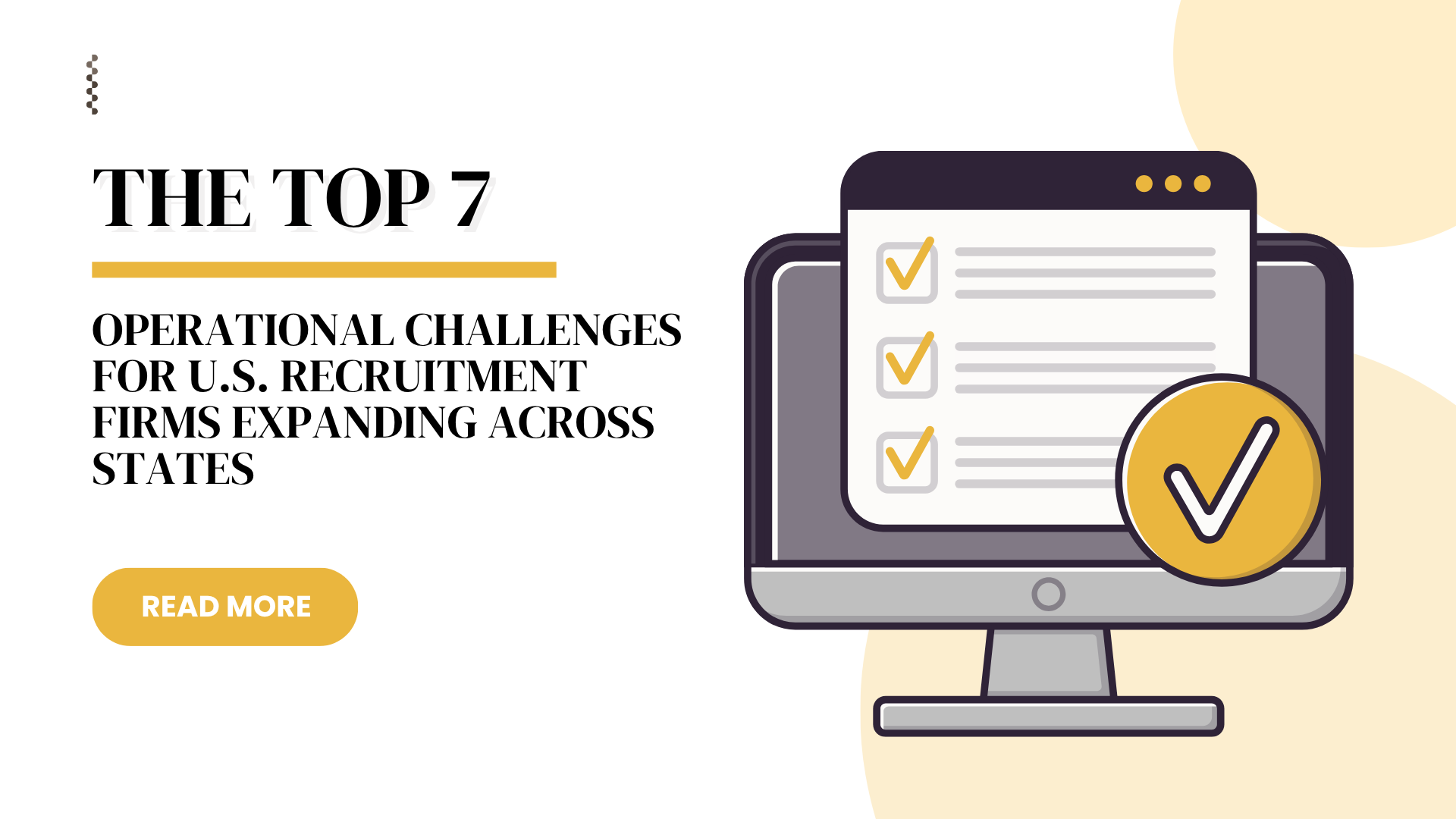Expanding your recruitment operations beyond your home state is a big step – and one that signals success. It means your reach is growing, demand is increasing, and your team is ready to take on new markets.
However, operating across multiple U.S. states isn’t as straightforward as it sounds. Every state has its own employment laws, payroll tax systems, and compliance requirements. The growth opportunity is huge, but so are the operational hurdles.
Here are the five biggest challenges recruitment firms encounter when expanding beyond their home state – followed by how an Employer of Record (EOR) helps solve them.
The top 7 operational challenges
State-Specific Compliance and Business Registration
Each state functions almost like its own mini country when it comes to employment. Companies must register for state specific accounts such unemployment insurance, handle state-specific tax obligations, and adhere to state/local labor laws (i.e. minimum wage requirements, employee notice rules, statutory sick leave). Keeping up with the paperwork in multiple jurisdictions can be time-consuming and costly.
The U.S. Small Business Administration outlines what’s required to register to do business in another state.
Complex Multi-State Payroll and Tax Filings
Once you employ or place workers in more than one state, payroll gets complicated fast. You’ll need to manage different tax rates, filing schedules. employment, and also determine how the worker‘s location impacts your businesses state/local income tax nexus.
Many states also impose their own unemployment insurance programs, each with unique contribution rates and rules.
Different State-Mandated Staff Training Requirements
Several states – including California, New York, Illinois, and Connecticut to name a few – require employers to provide sexual harassment prevention training for employees, often with specific rules on frequency, delivery method, and recordkeeping. As your business expands, ensuring every worker completes the right training at the right intervals can become a significant compliance challenge. Missing a mandated training window could expose your business or clients to penalties.
Statutory Sick Leave Tracking and Management
Paid sick leave laws differ widely across states (and sometimes even by city). For example, California, New Jersey, and Washington each have unique accrual, carryover, and usage rules. HR teams must track eligibility and balances accurately for every worker, ensuring compliance with local mandates while maintaining fairness and transparency across the workforce.
Varying Employee Benefits and Leave Laws
Paid leave, health insurance mandates, and retirement plan requirements differ by state. What’s compliant in Florida might not meet standards in California or New York. As your placements spread out, so do your benefits administration challenges.
Rising Administrative Overhead
Each new state means new forms, policies, and processes. HR teams end up juggling multiple sets of regulations, client expectations, and internal workflows. For many firms, this administrative load can slow hiring, increase costs, and pull focus from core recruiting.
A 2024 Gartner HR study found that nearly 70% of HR leaders cited ‘multi-jurisdictional compliance’ as their top operational pain point – highlighting how administrative strain limits growth potential for recruitment firms.
Inconsistent Candidate and Client Experience
When processes vary by state – from onboarding paperwork to pay cycles – it’s difficult to maintain a consistent experience for both clients and candidates. Inconsistency risks confusion, missed payments, or even lost placements.
How an EOR Helps Solve These Challenges
An EOR acts as the legal employer for your placed workers, handling payroll, benefits, tax filings, and compliance in every state where your talent is based. For recruitment firms, that means you can expand your footprint without the complexity of managing multiple legal entities.
Here’s how an EOR addresses each challenge:
- Compliance Made Simple – Your EOR is already registered and compliant in all 50 states. They ensure every hire meets local tax, labor, and insurance requirements from day one.
- Centralized Payroll Management – Rather than managing multiple systems, your EOR runs payroll across all states – ensuring correct deductions, filings, and timely payments.
- Consistent Benefits & Leave Administration – EORs standardize benefits offerings while staying compliant with local mandates, keeping every worker on equal footing.
- Reduced Operational Burden – Instead of hiring more HR and finance staff to handle expansion, you can lean on your EOR’s infrastructure – freeing your team to focus on client growth.
- Seamless Experience Across States – With one centralized process, onboarding and support feel the same for every candidate, no matter where they’re based – reinforcing your firm’s professionalism and reliability.
Scaling Beyond Borders, Without the Barriers
For growing recruitment firms, the ability to hire and place talent in new states is a huge competitive advantage – but managing it alone can slow momentum. Partnering with an EOR gives you the compliance foundation and operational stability to expand confidently. You focus on finding great talent and winning new business.
Speak to Lead & Gain about how our EOR model helps firms expand across states compliantly and efficiently – without the overhead.
